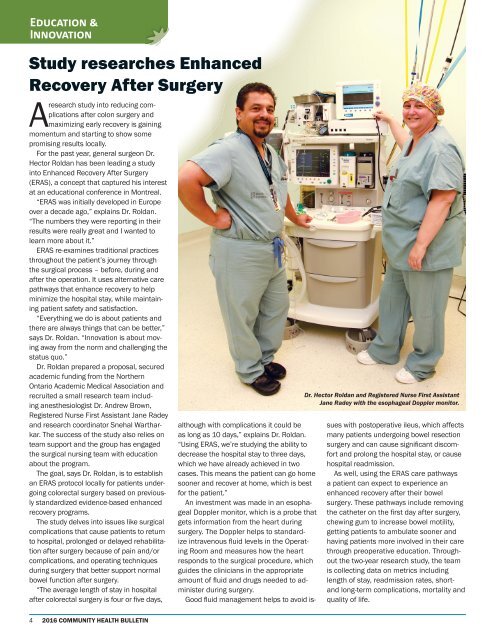MAHC-Community-Health-Bulletin-Final
You also want an ePaper? Increase the reach of your titles
YUMPU automatically turns print PDFs into web optimized ePapers that Google loves.
Eun <br />
Innvn<br />
Study researches Enhanced<br />
Recovery After Surgery<br />
A<br />
research study into reducing complications<br />
after colon surgery and<br />
maximizing early recovery is gaining<br />
momentum and starting to show some<br />
promising results locally.<br />
For the past year, general surgeon Dr.<br />
Hector Roldan has been leading a study<br />
into Enhanced Recovery After Surgery<br />
(ERAS), a concept that captured his interest<br />
at an educational conference in Montreal.<br />
“ERAS was initially developed in Europe<br />
over a decade ago,” explains Dr. Roldan.<br />
“The numbers they were reporting in their<br />
results were really great and I wanted to<br />
learn more about it.”<br />
ERAS re-examines traditional practices<br />
throughout the patient’s journey through<br />
the surgical process – before, during and<br />
after the operation. It uses alternative care<br />
pathways that enhance recovery to help<br />
minimize the hospital stay, while maintaining<br />
patient safety and satisfaction.<br />
“Everything we do is about patients and<br />
there are always things that can be better,”<br />
says Dr. Roldan. “Innovation is about moving<br />
away from the norm and challenging the<br />
status quo.”<br />
Dr. Roldan prepared a proposal, secured<br />
academic funding from the Northern<br />
Ontario Academic Medical Association and<br />
recruited a small research team including<br />
anesthesiologist Dr. Andrew Brown,<br />
Registered Nurse First Assistant Jane Radey<br />
and research coordinator Snehal Wartharkar.<br />
The success of the study also relies on<br />
team support and the group has engaged<br />
the surgical nursing team with education<br />
about the program.<br />
The goal, says Dr. Roldan, is to establish<br />
an ERAS protocol locally for patients undergoing<br />
colorectal surgery based on previously<br />
standardized evidence-based enhanced<br />
recovery programs.<br />
The study delves into issues like surgical<br />
complications that cause patients to return<br />
to hospital, prolonged or delayed rehabilitation<br />
after surgery because of pain and/or<br />
complications, and operating techniques<br />
during surgery that better support normal<br />
bowel function after surgery.<br />
“The average length of stay in hospital<br />
after colorectal surgery is four or fi ve days,<br />
Dr. Hector Roldan and Registered Nurse First Assistant<br />
Jane Radey with the esophageal Doppler monitor.<br />
although with complications it could be<br />
as long as 10 days,” explains Dr. Roldan.<br />
“Using ERAS, we’re studying the ability to<br />
decrease the hospital stay to three days,<br />
which we have already achieved in two<br />
cases. This means the patient can go home<br />
sooner and recover at home, which is best<br />
for the patient.”<br />
An investment was made in an esophageal<br />
Doppler monitor, which is a probe that<br />
gets information from the heart during<br />
surgery. The Doppler helps to standardize<br />
intravenous fl uid levels in the Operating<br />
Room and measures how the heart<br />
responds to the surgical procedure, which<br />
guides the clinicians in the appropriate<br />
amount of fl uid and drugs needed to administer<br />
during surgery.<br />
Good fl uid management helps to avoid issues<br />
with postoperative ileus, which affects<br />
many patients undergoing bowel resection<br />
surgery and can cause signifi cant discomfort<br />
and prolong the hospital stay, or cause<br />
hospital readmission.<br />
As well, using the ERAS care pathways<br />
a patient can expect to experience an<br />
enhanced recovery after their bowel<br />
surgery. These pathways include removing<br />
the catheter on the fi rst day after surgery,<br />
chewing gum to increase bowel motility,<br />
getting patients to ambulate sooner and<br />
having patients more involved in their care<br />
through preoperative education. Throughout<br />
the two-year research study, the team<br />
is collecting data on metrics including<br />
length of stay, readmission rates, shortand<br />
long-term complications, mortality and<br />
quality of life.<br />
4 2016 COMMUNITY HEALTH BULLETIN


